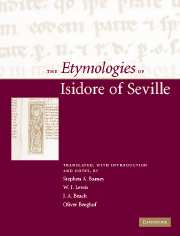Book contents
- Frontmatter
- Contents
- Acknowledgements
- Note to the Reader
- INTRODUCTION
- THE ETYMOLOGIES
- Analytical table of contents
- Book I Grammar (De grammatica)
- Book II Rhetoric and dialectic (De rhetorica et dialectica)
- Book III Mathematics (De mathematica)
- Book IV Medicine (De medicina)
- Book V Laws and times (De legibus et temporibus)
- Book VI Books and ecclesiastical offices (De libris et officiis ecclesiasticis)
- Book VII God, angels, and saints (De deo, angelis et sanctis)
- Book VIII The church and sects (De ecclesia et sectis)
- Book IX Languages, nations, reigns, the military, citizens, family relationships (De linguis, gentibus, regnis, militia, civibus, affinitatibus)
- Book X Vocabulary (De vocabulis)
- Book XI The human being and portents (De homine et portentis)
- Book XII Animals (De animalibus)
- Book XIII The cosmos and its parts (De mundo et partibus)
- Book XIV The earth and its parts (De terra et partibus)
- Book XV Buildings and fields (De aedificiis et agris)
- Book XVI Stones and metals (De lapidibus et metallis)
- Book XVII Rural matters (De rebus rusticis)
- Book XVIII War and games (De bello et ludis)
- Book XIX Ships, buildings, and clothing (De navibus aedificiis et vestibus)
- Book XX (Provisions and various implements)
- APPENDIX Correspondence of Isidore and Braulio
- INDEX
Book IV - Medicine (De medicina)
Published online by Cambridge University Press: 22 September 2009
- Frontmatter
- Contents
- Acknowledgements
- Note to the Reader
- INTRODUCTION
- THE ETYMOLOGIES
- Analytical table of contents
- Book I Grammar (De grammatica)
- Book II Rhetoric and dialectic (De rhetorica et dialectica)
- Book III Mathematics (De mathematica)
- Book IV Medicine (De medicina)
- Book V Laws and times (De legibus et temporibus)
- Book VI Books and ecclesiastical offices (De libris et officiis ecclesiasticis)
- Book VII God, angels, and saints (De deo, angelis et sanctis)
- Book VIII The church and sects (De ecclesia et sectis)
- Book IX Languages, nations, reigns, the military, citizens, family relationships (De linguis, gentibus, regnis, militia, civibus, affinitatibus)
- Book X Vocabulary (De vocabulis)
- Book XI The human being and portents (De homine et portentis)
- Book XII Animals (De animalibus)
- Book XIII The cosmos and its parts (De mundo et partibus)
- Book XIV The earth and its parts (De terra et partibus)
- Book XV Buildings and fields (De aedificiis et agris)
- Book XVI Stones and metals (De lapidibus et metallis)
- Book XVII Rural matters (De rebus rusticis)
- Book XVIII War and games (De bello et ludis)
- Book XIX Ships, buildings, and clothing (De navibus aedificiis et vestibus)
- Book XX (Provisions and various implements)
- APPENDIX Correspondence of Isidore and Braulio
- INDEX
Summary
i. Medicine (De medicina) 1. Medicine is the art that protects or restores the body's health; its subject matter concerns illnesses and wounds. 2. To medicine belong not only things practiced by the skill of those properly called physicians (medicus), but also matters of food and drink, clothing and shelter. Ultimately, it consists of every defense and fortification by means of which our body is preserved [healthy] in the face of external blows and accidents.
ii. The term ‘medicine’ (De nomine eius) The term ‘medicine’ (medicina) is thought to be drawn from ‘moderation’ (modus), that is, temperateness, in that medicine is applied not in full measure but little by little. Indeed, nature grieves at excess and rejoices at restraint. Hence those who drink potions and remedies copiously and unceasingly are troubled. Anything that is immoderate brings not health but danger.
iii. The inventors of medicine (De inventoribus medicinae) 1. Among the Greeks, Apollo is considered the author and discoverer of the art of medicine. His son Aesculapius expanded the art, whether in esteem or in effectiveness, 2. but after Aesculapius was killed by a bolt of lightning, the study of healing was declared forbidden, and the art died along with its author, and was hidden for almost fifty years, until the time of Artaxerxes, king of the Persians. Then Hippocrates, a descendant of Asclepius (i.e. Aesculapius) born on the island of Cos, brought it to light again.
- Type
- Chapter
- Information
- The Etymologies of Isidore of Seville , pp. 109 - 116Publisher: Cambridge University PressPrint publication year: 2006

